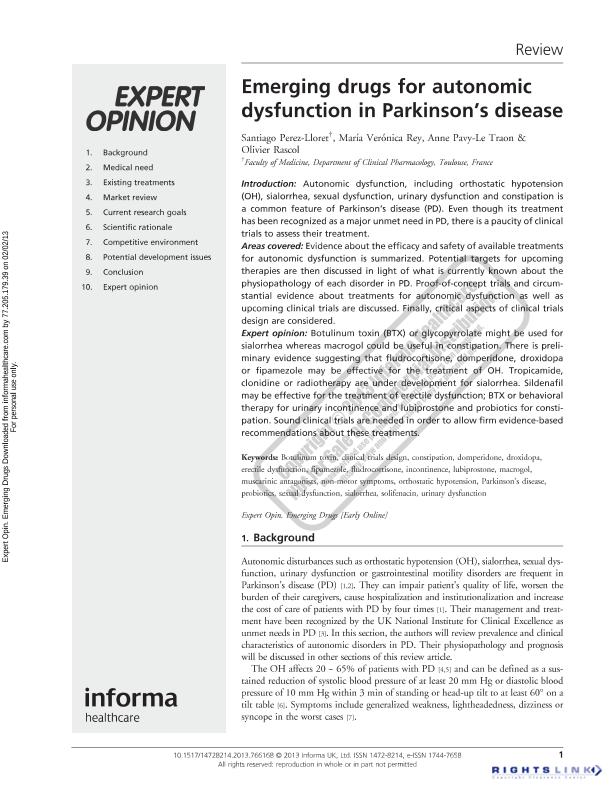Artículo
Emerging drugs for autonomic dysfunction in Parkinson's disease
Fecha de publicación:
03/2013
Editorial:
Taylor & Francis
Revista:
Expert Opinion on Emerging Drugs
ISSN:
1472-8214
Idioma:
Inglés
Tipo de recurso:
Artículo publicado
Clasificación temática:
Resumen
Introduction: Autonomic dysfunction, including orthostatic hypotension (OH), sialorrhea, sexual dysfunction, urinary dysfunction and constipation is a common feature of Parkinson’s disease (PD). Even though its treatment has been recognized as a major unmet need in PD, there is a paucity of clinical trials to assess their treatment. Areas covered: Evidence about the efficacy and safety of available treatments for autonomic dysfunction is summarized. Potential targets for upcoming therapies are then discussed in light of what is currently known about the physiopathology of each disorder in PD. Proof-of-concept trials and circumstantial evidence about treatments for autonomic dysfunction as well as upcoming clinical trials are discussed. Finally, critical aspects of clinical trials design are considered. Expert opinion: Botulinum toxin (BTX) or glycopyrrolate might be used for sialorrhea whereas macrogol could be useful in constipation. There is preliminary evidence suggesting that fludrocortisone, domperidone, droxidopa or fipamezole may be effective for the treatment of OH. Tropicamide, clonidine or radiotherapy are under development for sialorrhea. Sildenafil may be effective for the treatment of erectile dysfunction; BTX or behavioral therapy for urinary incontinence and lubiprostone and probiotics for constipation. Sound clinical trials are needed in order to allow firm evidence-based recommendations about these treatments.
Archivos asociados
Licencia
Identificadores
Colecciones
Articulos(SEDE CENTRAL)
Articulos de SEDE CENTRAL
Articulos de SEDE CENTRAL
Citación
Pérez Lloret, Santiago; Rey, María Verónica; Pavy Le Traon, Anne; Rascol, Olivier; Emerging drugs for autonomic dysfunction in Parkinson's disease; Taylor & Francis; Expert Opinion on Emerging Drugs; 18; 1; 3-2013; 39-53
Compartir
Altmétricas




